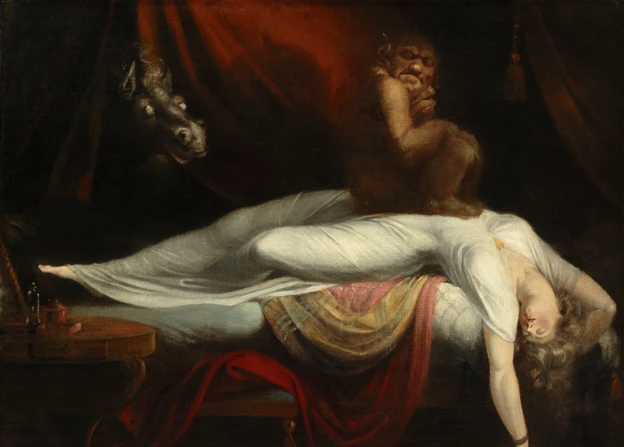Nightmares have a unique way of infiltrating our dreams, leaving us with a jumble of emotions and a lingering sense of unease. These unsettling experiences often contain powerful symbolism that can provide valuable insights into our subconscious fears and anxieties. In this article, we will dive deep into the twisted realms of common nightmare themes, analyzing the intricate details and uncovering the hidden meanings behind them. From the terrifying sensation of falling to the unnerving pursuit of being chased, from the vulnerability of teeth falling out to the disconcerting exposure of being naked in public, we will explore the symbolism embedded within these haunting dreams. Prepare to embark on a journey of self-discovery and unravel the enigmatic symbolism that resides within our nightmares.
1. The Falling Dream

Many of us have experienced the unsettling sensation of free-falling in our dreams, where we plummet through the air with an overwhelming sense of dread and helplessness. The falling dream is one of the most common and perplexing nightmares, leaving us questioning its significance. While it may seem like a terrifying experience, the symbolism behind falling dreams is often rooted in feelings of insecurity and loss of control. The act of falling symbolizes a fear of failure, the inability to keep up with the demands of life, or a sense of being overwhelmed by circumstances. It can also reflect a fear of letting go or the need to maintain a sense of stability. These dreams may be triggered by actual experiences of falling, such as a stumble or a loss of balance during the day, or they could be related to deeper emotional issues. Understanding the complexities of the falling dream can provide valuable insights into our emotions and memories, and help us navigate the challenges we face in our waking lives.
1.1 Significance of Falling
The falling dream holds a profound significance within the realm of nightmares. When we experience the sensation of falling in our dreams, it often reflects our deep-seated fears and insecurities in waking life. This dream symbolizes a loss of control and a fear of failure or inadequacy. The act of falling represents a metaphorical descent, where we feel overwhelmed by the challenges and pressures we face. It can also indicate a fear of the unknown or a reluctance to let go of control. The symbolism behind falling dreams can vary depending on the context and personal experiences of the dreamer. For some, it may be related to specific traumatic events or a sense of powerlessness in their daily lives. For others, it may highlight their struggle to keep up with the demands of society or the fear of not meeting expectations. Understanding the significance of falling dreams can provide valuable insights into our psychological well-being and help us address any underlying issues. By exploring the symbolism embedded within these dreams, we can work towards preventing nightmares and improving overall sleep quality.
1.2 Causes of Falling Dreams
Falling dreams can stem from a variety of causes, both internal and external. One possible cause is anxiety or stress. When we experience high levels of stress in our daily lives, it can manifest in our dreams as a sensation of falling. This may represent a feeling of being overwhelmed or out of control in certain aspects of our waking life. Similarly, traumatic events or emotional turmoil can also trigger falling dreams. These dreams may serve as a way for our subconscious mind to process and cope with unresolved emotional issues.
In some cases, physical sensations during sleep can contribute to falling dreams. For example, if you sleep in an uncomfortable position or have a restless night, it may translate into a falling dream as your body adjusts and reacts to the discomfort.
Additionally, certain medications or substances can influence dream experiences, causing falling dreams as a side effect. Stimulants, such as caffeine or nicotine, can impact the quality of sleep and lead to vivid and intense dreams, including falling scenarios.
It is important to note that falling dreams are not limited to negative causes. Sometimes, falling dreams can also arise as a result of excitement or anticipation. The feeling of butterflies in the stomach or a rush of adrenaline can manifest as a sensation of falling in dreams, representing the thrill of a new experience or stepping outside of our comfort zone.
Understanding the various causes of falling dreams can help us gain insight into our innermost thoughts and emotions. By identifying the potential triggers, we can address any underlying issues or make adjustments to our lifestyle, ultimately leading to a more peaceful and fulfilling dream state.
1.3 Interpreting the Symbolism
Interpreting the symbolism behind the falling dream can offer us profound insights into our subconscious fears and anxieties. While the falling sensation itself may evoke feelings of terror and helplessness, it is crucial to delve deeper into the underlying meanings. One possible interpretation is that the fall represents a fear of failure or the inability to meet the expectations placed upon us. It could signify a lack of control in our lives, where we feel overwhelmed by circumstances or unable to keep up with the demands of daily existence. Additionally, the falling dream may reflect a fear of letting go or the need to maintain stability in the face of uncertainty. It is essential to consider the context and personal experiences surrounding the dream as they can influence the symbolism. Exploring the emotions evoked by the falling dream, such as fear, anxiety, or a sense of loss, can provide valuable insights into the aspects of our lives that require attention or resolution. By examining the symbolic meaning of these dreams, we can gain a deeper understanding of ourselves, overcome challenges, and work towards personal growth and self-empowerment.
2. Being Chased or Pursued
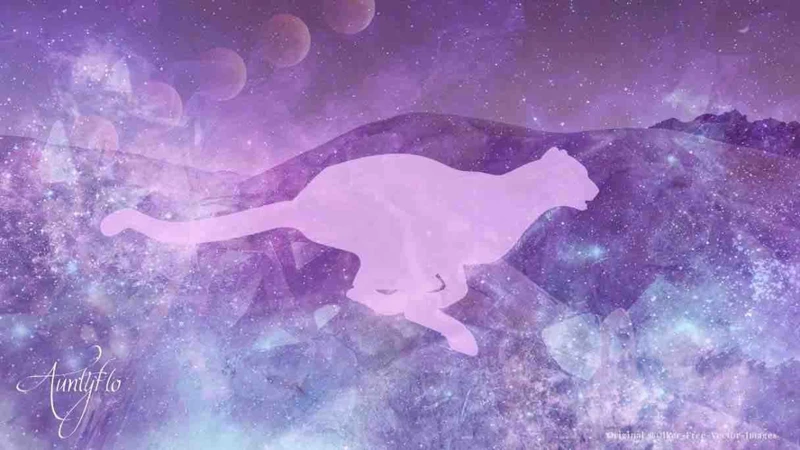
In the realm of nightmares, few experiences evoke a sense of terror quite like being chased or pursued. This disturbing dream theme taps into our primal fears, triggering a rush of adrenaline and a desperate urge to escape. The fear of being chased in dreams often signifies a deeper psychological fear or threat in our waking lives. It reflects a sense of vulnerability, powerlessness, and the need to flee from a perceived danger. The roots of chase dreams can be traced back to our primal survival instincts, as well as unresolved conflicts or unresolved issues in our relationships or daily lives. Decoding the symbolism within these relentless pursuits can provide profound insights into our fears, anxieties, and the challenges we face in our waking world. Understanding the origins and layers of meaning in these unsettling dreams can help us gain a deeper understanding of ourselves and navigate through life with greater clarity and resilience.
2.1 The Fear of Being Chased
The fear of being chased in dreams is a common theme that can evoke intense emotions and a sense of panic. These nightmares often stem from deep-rooted fears and anxieties, symbolizing a feeling of being pursued or hunted in our waking lives. The act of being chased represents a sense of threat or danger, whether it be physically or emotionally. It can reflect the fear of confrontation, the fear of being exposed or judged, or the fear of facing our own inner demons. Often, the person or entity doing the chasing in the dream holds significance as well. It may represent a specific person or situation that we feel is pursuing us or causing distress. This dream theme can be linked to feelings of powerlessness, vulnerability, or unresolved conflicts. Understanding the fear of being chased in dreams can help us address and confront the underlying issues that trigger these intense emotions, allowing us to regain a sense of control and find ways to overcome our fears.
2.2 Origin of Chase Dreams
Chase dreams have roots in our primal instincts and the fight-or-flight response ingrained in our DNA. The origin of chase dreams can be traced back to our ancestors who constantly faced threats from predators or rival groups. These dreams tap into our innate survival mechanisms and serve as a way for our subconscious minds to process and prepare for potential danger. When we dream of being chased, our brain activates the same regions responsible for fear and anxiety, triggering a surge of adrenaline and heightened alertness. This physiological response is a remnant of our ancestors’ need to react quickly to threats in order to survive. It is believed that chase dreams may also stem from unresolved conflicts or feelings of being pursued in our waking lives. This could include unresolved issues with relationships, work-related stress, or even internal struggles. Our brain uses the symbolism of being chased to represent the pressure and stress we feel, manifesting as a relentless pursuer in our dreams. Understanding the origin of chase dreams can help us recognize the underlying sources of stress and anxiety in our lives and take steps to address them.
2.3 Decoding the Symbolism
When it comes to decoding the symbolism behind the common nightmare theme of being chased or pursued, it is essential to consider the specific elements and emotions present in the dream. The act of being chased represents a deep-rooted fear or threat that is persistently pursuing us in our waking lives. It may symbolize a sense of running away from our responsibilities, fears, or unresolved issues. The identity of the pursuer can be significant as well, as it often represents a reflection of our own internal struggles or external pressures. Are we running from a faceless entity, a known individual, or a symbolic representation of a particular situation? Exploring the relationship between the chaser and the one being chased is important too. Is the pursuer constantly one step behind, or is there a feeling of inevitability and imminent capture?
Additionally, the setting of the chase dream can provide further insight into its symbolism. Are you running through familiar or unfamiliar terrain? Are you able to find refuge or escape routes? These details can reflect the level of control or resources we perceive ourselves to have in confronting the issues that haunt us. It is essential, however, to remember that each individual’s interpretation of their dreams is unique. While general symbols and themes can provide a framework for analysis, personal associations and experiences play a crucial role in understanding the deeper meaning of being chased or pursued in a dream. Exploring these dreams can lead to a greater understanding of our fears, anxieties, and the steps we need to take to regain a sense of control and security in our waking lives.
3. Teeth Falling Out

One of the most disconcerting nightmare themes is the teeth falling out dream. This vivid and unsettling experience leaves us with a sense of fear and insecurity. Symbolically, the act of teeth falling out represents a loss of power and control. It can reflect feelings of vulnerability, a fear of aging, or concerns about communication and self-expression. Psychologically, these dreams may be connected to underlying anxieties about one’s appearance, self-image, or social acceptance. Additionally, the teeth falling out dream can be linked to a fear of judgment or a subconscious desire to hide imperfections. Exploring the deeper meanings behind these dreams can provide valuable insights into our fears and insecurities, allowing us to address them and move towards a place of self-acceptance and confidence.
3.1 Fear and Insecurity
Fear and insecurity are at the core of the nightmare theme of teeth falling out. This anxiety-inducing dream often leaves individuals with a lingering sense of vulnerability and apprehension. The symbolism of teeth falling out in dreams taps into deep-seated fears associated with losing control, powerlessness, and a loss of self-confidence. The act of teeth falling out represents a fear of aging, the passage of time, and the inevitable decay of one’s physical and mental faculties. It reflects a sense of insecurity about one’s appearance, communication skills, and personal relationships. These dreams can also stem from feelings of inadequacy or a fear of judgment from others. The fear of teeth falling out resonates with our primal instincts of survival and our desire to maintain a strong and capable persona. It is important to note that the symbolism of teeth falling out can have different interpretations based on cultural and personal beliefs, but the underlying theme of fear and insecurity remains constant. By examining the context and individual emotions associated with the teeth falling out nightmare, we can gain a deeper understanding of our own fears and insecurities, allowing us to address and overcome them in our waking lives.
3.2 Psychological Interpretations
Psychological interpretations of the nightmare theme of teeth falling out delve into the deep-seated fears and insecurities that this imagery represents. One interpretation suggests that the loss of teeth symbolizes a loss of power or control in one’s life. The act of losing teeth is often associated with feelings of vulnerability, helplessness, and a fear of aging or mortality. It can also reflect anxieties about communication and self-expression.
Another psychological interpretation revolves around the significance of teeth in interpersonal relationships. Teeth are important for communication, particularly in terms of speech and appearance. The nightmare of teeth falling out may point to insecurities about how we are perceived by others, concerns about our image or attractiveness, or even anxieties about social acceptance and rejection.
Psychologists propose that teeth falling out dreams can be linked to underlying feelings of powerlessness or a loss of confidence. These dreams may arise during times of stress, when individuals are grappling with self-doubt or facing challenges where they feel unable to assert themselves effectively. The fear of being judged or criticized can manifest in the symbolism of teeth falling out, representing a fear of losing face or feeling inadequate.
The psychological interpretations of teeth falling out in nightmares provide a multi-faceted understanding of the symbolism. They touch upon themes of control, communication, interpersonal dynamics, and self-image, allowing individuals to reflect on their fears and insecurities, and potentially work towards finding resolution and empowerment.
3.3 Unraveling the Symbolic Meaning
Unraveling the symbolic meaning of dreams where teeth fall out is like embarking on a puzzling journey into the depths of our subconscious. The symbolism behind this common nightmare theme can vary, but it often reflects feelings of fear, insecurity, and vulnerability. One interpretation suggests that losing teeth represents a fear of aging and mortality, as our teeth are associated with youth and vitality. Additionally, it can symbolize concerns about our appearance and how others perceive us. The act of teeth falling out can also signify a loss of power or control in some aspect of our lives, as teeth are vital tools for communication and self-expression. Another psychological interpretation suggests that this dream theme is linked to feelings of powerlessness and the fear of losing something important to us. It may be connected to situations where we feel powerless and unable to assert ourselves. Exploring the symbolic meaning of teeth falling out dreams can provide valuable insights into our deepest fears and insecurities, helping us gain a better understanding of ourselves and how we navigate the world around us.
When we attempt to unravel the symbolic meaning behind dreams where teeth fall out, it is essential to consider the contextual elements surrounding the dream. For instance, the specific details of the dream, such as the condition of the teeth, the presence of pain or blood, or the reactions of others in the dream, can provide additional clues to its interpretation. It is also essential to reflect on personal experiences and emotions that may be connected to the dream. By examining these various factors and considering them in conjunction with the broader symbolism of teeth falling out, we can gain a more nuanced understanding of the dream’s significance.
It is worth noting that cultural and individual differences can impact the symbolic interpretation of teeth falling out dreams. While certain general themes may be prevalent across different individuals, the personal experiences, beliefs, and cultural upbringing of the dreamer can influence the specific meaning attached to this dream theme. It is crucial not to rely solely on generic interpretations but to approach each dream with an open mind and an understanding that the symbolism may vary.
Unraveling the symbolic meaning of dreams where teeth fall out involves navigating through layers of fear, insecurity, and vulnerability. The interpretation of this common nightmare theme can vary, but it often reflects concerns about aging, appearance, powerlessness, and self-expression. By paying attention to the contextual elements of the dream and considering personal experiences and emotions, we can gain a deeper understanding of the dream’s significance and how it relates to our waking lives.
4. Being Naked in Public
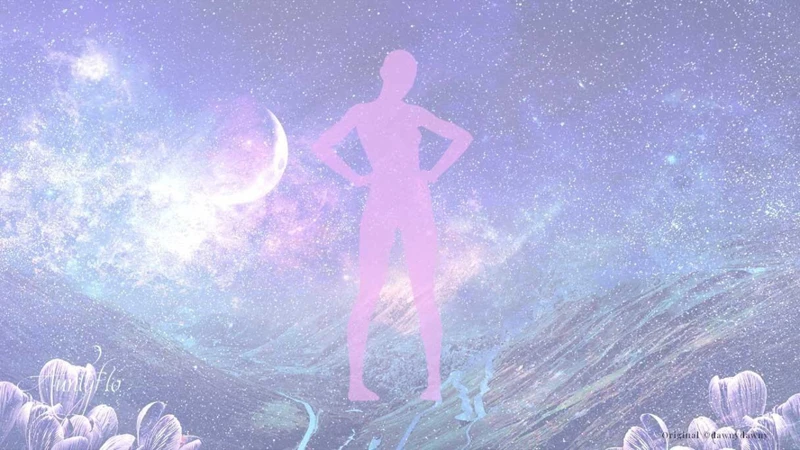
Imagine the mortifying scenario of finding yourself completely naked in public. This common and deeply embarrassing nightmare theme often elicits a torrent of perplexing emotions and leaves us questioning its symbolic meaning. The vulnerability and exposure associated with being naked in public symbolize a fear of judgment, criticism, and social scrutiny. It taps into our insecurities and self-image concerns, highlighting our fear of being seen as flawed or inadequate. This recurring nightmare may stem from underlying anxieties about our appearance, self-esteem, or fear of rejection. It could also reflect a deeper desire for authenticity and a need to let go of societal expectations. By exploring the symbolic layers of being naked in public, we can gain a better understanding of our own vulnerabilities and insecurities, ultimately leading us towards self-acceptance and confidence.
4.1 The Exposure of Vulnerability
The nightmare of being naked in public taps into deep-seated anxieties surrounding vulnerability and the fear of judgment. This dream conjures a sense of embarrassment and exposure, leaving the dreamer feeling completely exposed and full of shame. The symbolism within this dream revolves around our self-image and social anxieties. It reflects a fear of revealing our true selves to others, as well as a fear of being judged or ridiculed for our flaws and imperfections. The vulnerability experienced in this dream can stem from a lack of confidence or low self-esteem, contributing to feelings of inadequacy and fear of rejection. This dream often arises during times of high stress or when we feel that we do not measure up to societal expectations. It serves as a reminder to examine our insecurities and work towards building self-acceptance and a stronger sense of self-worth. In order to unravel the complex symbolism of being naked in public, it is important to look inward and address our own beliefs and fears about our vulnerability and how we are perceived by others.
4.2 Social Anxiety and Self-Image
Social anxiety and self-image play a significant role in the symbolism behind the nightmare theme of being naked in public. This common and distressing dream often reflects underlying insecurities and fears surrounding how we are perceived by others. Social anxiety is characterized by an intense fear of judgment, embarrassment, or rejection in social situations. When this anxiety manifests in a dream, it takes the form of being exposed and vulnerable in front of others. The fear of being naked in public represents a fear of being seen for who we truly are, stripped of any masks or defenses we may put up in our waking lives.
Additionally, the concept of self-image is closely intertwined with the symbolism of this dream. Our self-image refers to how we perceive ourselves and how we believe others see us. When we dream of being naked in public, it often reflects deep-seated insecurities about our physical appearance or our overall worthiness as individuals. It highlights a fear of being judged or ridiculed based on our flaws and imperfections.
These dreams may stem from past experiences of embarrassment or shame, often related to moments of feeling exposed or judged in social settings. They can also arise from societal pressure to meet certain standards of beauty or societal norms. The symbolism in this dream serves as a reminder to examine our self-perception, confront our insecurities, and work towards cultivating a sense of self-acceptance and confidence.
Understanding the connection between social anxiety and self-image in the context of being naked in public dreams can provide valuable insights into the underlying emotions and insecurities that may be affecting our daily lives. By addressing these concerns, we can work towards developing a healthier sense of self and navigate social interactions with greater ease and confidence.
4.3 Analyzing the Symbolism
Analyzing the symbolism in dreams where one is naked in public can offer a deeper understanding of the psychological meanings behind this unsettling and vulnerable experience. The symbolic interpretation of being naked in public revolves around the exposure of one’s true self, both physically and emotionally. It often reflects feelings of insecurity, fear of judgment, or a sense of being unprepared or unmasked in social situations. The lack of clothing represents a loss of control and a fear of being seen for who we truly are, stripped of any social masks or pretenses. This dream theme can also signify social anxiety and self-image concerns, as individuals may fear being ridiculed or rejected by others due to their perceived flaws or imperfections. Exploring the symbolism of being naked in public allows individuals to delve into their deepest insecurities and can be a catalyst for personal growth and self-acceptance. By addressing the underlying emotions and experiences that contribute to this dream theme, individuals can work towards building confidence, embracing vulnerability, and developing a stronger sense of self.
5. Drowning or Suffocation

The sensation of drowning or suffocation in a dream can be a distressing and overwhelming experience. In the realm of nightmares, this common theme holds profound symbolic meaning. Drowning or suffocation dreams often represent a sense of helplessness, the feeling of being overwhelmed by life’s challenges, or a fear of being unable to breathe freely in certain situations. Symbolically, these dreams may reflect deep-seated anxieties, emotional suffocation, or the suppression of one’s true thoughts and feelings. They can also be associated with a fear of losing control or being trapped in unhealthy circumstances. Understanding the intricate symbolism behind these distressing dreams can provide valuable insights into our subconscious fears and help us navigate the suffocating aspects of our waking lives. By exploring the deeper meanings associated with drowning or suffocation dreams, we can work towards finding a sense of liberation and breathing freely once again.
5.1 The Sense of Helplessness
The sensation of drowning or suffocating in a dream can elicit intense feelings of panic and fear. In dreams where we experience such struggles, there is often a pervasive sense of helplessness that permeates the experience. This helplessness emanates from the perceived lack of control and the inability to escape from a suffocating or drowning situation. When we are unable to breathe or break free from confinement in our dreams, it reflects a deep-rooted anxiety about our ability to navigate challenges or feel empowered in our waking lives. The suffocating or drowning symbolism may arise from feelings of being overwhelmed, trapped, or smothered by external circumstances, relationships, or responsibilities. These dreams can also point to a fear of powerlessness or a lack of agency in certain areas of our lives. It is crucial to explore and address the underlying emotions and situations that contribute to this sense of helplessness in order to find ways to regain control and build resilience. Understanding the symbolic significance of suffocating or drowning dreams can serve as a catalyst for personal growth and empowerment.
5.2 Exploring Deeper Meanings
Exploring the deeper meanings behind drowning or suffocation dreams can unveil a wealth of insights into our subconscious fears and emotional struggles. These dreams, characterized by a sense of helplessness and inability to breathe, often symbolize a feeling of being overwhelmed, trapped, or suffocated in our waking lives. The act of drowning or suffocating in a dream can represent a fear of losing control, being stifled in relationships or situations, or struggling with suppressed emotions. It may also be a manifestation of anxiety or a need for self-care and rejuvenation. Delving into the symbolic layers of these dreams can offer a profound understanding of the intricate ways in which our subconscious mind processes and addresses our deepest fears and concerns. By acknowledging and exploring the deeper meanings of drowning or suffocation dreams, we can gain valuable insights and find ways to address and overcome the challenges that manifest in our waking lives.
5.3 Unmasking the Symbolism
Unmasking the symbolism behind drowning or suffocation dreams can shed light on the deep-rooted fears and anxieties that manifest in our subconscious minds. These dreams often signify a sense of helplessness and a struggle to breathe, both literally and metaphorically. Symbolically, drowning or suffocation can represent overwhelming emotions, feeling stifled in a situation or relationship, or a fear of losing control. It may reflect a lack of assertiveness in expressing one’s needs or feeling overwhelmed by external pressures. The symbolism can also be linked to a fear of being overwhelmed by responsibilities or drowning in the demands of daily life. Additionally, drowning dreams can be associated with unresolved traumatic experiences or a fear of death. By examining the symbolic meaning behind drowning or suffocation dreams, we can gain a deeper understanding of our own emotions, confront our fears, and take steps towards finding inner peace and resilience.
6. Being Lost or Trapped
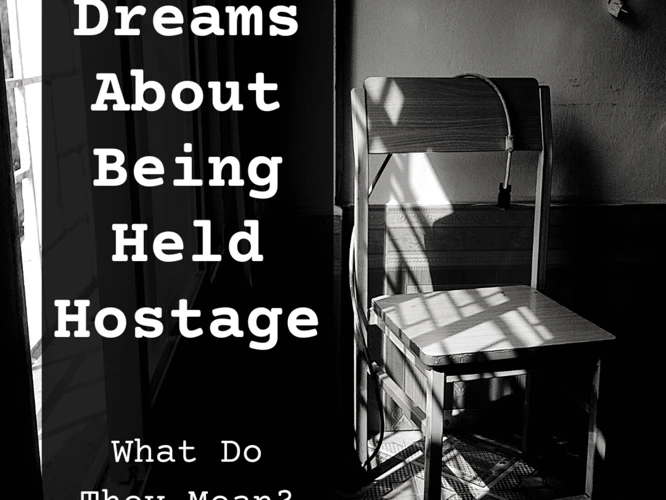
Feeling lost or trapped in a dream can be an incredibly unsettling experience, leaving us with a sense of powerlessness and confusion. These nightmares often reflect our deepest fears and anxieties about being unable to navigate through life’s challenges or feeling trapped in a situation from which there is no escape. Being lost or trapped can symbolize a lack of direction, uncertainty about our goals or purpose, or a feeling of being overwhelmed by the demands of our daily lives. These dreams may stem from moments of indecision or feeling stuck in our waking lives, where we grapple with important decisions or find ourselves in restrictive environments. Exploring the symbolism within these dreams can provide us with valuable insights into our unconscious desires for freedom, clarity, and a sense of purpose. It is a reminder to assess our current circumstances and find ways to break free from the metaphorical prisons that hold us back, allowing us to lead more fulfilling lives.
6.1 The Feeling of Powerlessness
The feeling of powerlessness is a prevailing theme in dreams where individuals find themselves lost or trapped. These dreams evoke a sense of helplessness, as if being caught in a maze with no way out. The symbolism behind this common nightmare theme reflects our deep-seated fears of being overwhelmed, unable to make decisions, or lacking control in our waking lives. It can stem from various sources, such as unresolved conflicts, difficult relationships, or challenging situations where we feel trapped and bound by circumstances beyond our control.
Dreams of feeling lost or trapped may also manifest during times of change or uncertainty, highlighting our anxieties and insecurities about the future. They tend to surface when we are grappling with life transitions or facing major decisions. The dream may serve as a metaphor for feeling lost in our identity or direction, reflecting a struggle to find our place in the world. It can be a reflection of our need to regain a sense of power and authority over our own lives.
Dreams of being lost or trapped can tie into deeper psychological issues relating to self-esteem and self-worth. These dreams may highlight feelings of inadequacy, fear of judgment, or the need to conform to societal expectations. They can also signify a sense of entrapment in unhealthy patterns or relationships, where we feel unable to break free.
It is important to recognize that these dreams are symbolic and not necessarily literal representations of our daily experiences. By exploring the symbolic meaning of feeling lost or trapped in our dreams, we can gain a deeper understanding of our own emotions, fears, and aspirations. This self-awareness can empower us to navigate through the challenges in our waking lives, find the strength to make necessary changes, and reclaim our sense of personal power.
6.2 Origins of Being Lost Dreams
Being lost in a dream is a disorienting and unsettling experience, often leaving us with a sense of confusion and anxiety. The origins of being lost dreams can be traced back to various factors and influences. One possible origin is the fear of losing one’s way in life, of feeling directionless, or of not knowing the path to take. It may stem from the subconscious mind grappling with decision-making processes or feeling overwhelmed by choices and opportunities. Another origin could be related to experiences of being physically lost in real life, such as getting lost in an unfamiliar place or feeling lost while traveling. These experiences can leave a lasting impression on our minds and manifest in dreams as a reflection of our anxieties. The origins of being lost dreams may also be connected to feelings of being emotionally or psychologically lost, where one may feel disconnected from their purpose, relationships, or sense of self. These dreams can often serve as a reminder to reassess one’s life and find ways to reconnect with what truly matters. Understanding the origins of being lost dreams can provide valuable insights into the underlying issues that need to be addressed and can guide us towards finding a path forward in our waking lives.
6.3 Symbolic Interpretations
Symbolic interpretations of being lost or trapped in dreams can shed light on the deeper meaning behind these unsettling experiences. Each individual’s dream is unique, but there are some common themes and interpretations that can help us understand the symbolism. One interpretation of feeling lost or trapped is a representation of powerlessness or a lack of control in our lives. It may signify that we are stuck in a situation or relationship where we feel helpless and unable to escape. Another interpretation is that the dream is reflecting our inner struggles or conflicts. Being lost or trapped in a dream can symbolize a sense of confusion or indecision in our waking lives, where we are unsure of what path to take or how to navigate a particular situation. It may also indicate a fear of the unknown or a fear of change. Additionally, being lost or trapped in dreams can be associated with feelings of isolation and disconnection from others. It may point to a need for connection and belonging in our relationships and social interactions. Exploring these symbolic interpretations can help us gain valuable insights into our subconscious fears and desires, guiding us towards finding solutions and establishing a sense of empowerment in our waking lives.
7. Exam or Test Anxiety

We’ve all experienced the anxiety-inducing scenario of being unprepared for an important exam or test, and this fear often seeps into our dreams as well. The overwhelming feeling of exam or test anxiety can manifest in nightmares where we find ourselves facing challenging questions or struggling to find answers. The symbolism behind these dreams is rooted in the fear of failure and judgment. They reflect our insecurities and anxieties surrounding our academic performance, as well as our fear of not meeting the expectations placed upon us. Childhood trauma and academic pressure can also contribute to these types of dreams, as they tap into deeply ingrained fears and insecurities. Understanding the symbolism behind exam or test anxiety dreams can help us confront our fears, address any underlying issues, and find strategies to cope with the pressure. Whether these dreams are a reflection of past experiences or current challenges, they offer an opportunity for self-reflection and growth. For more information on understanding and managing nightmares, visit our article on psychological nightmares.
7.1 Fear of Failure or Judgment
The fear of failure or judgment is a central theme in nightmares involving exams or tests, often triggering feelings of anxiety and distress. These dreams reflect our deep-seated fears of not meeting expectations, disappointing others, or being judged harshly. The symbolic significance lies in the high-pressure environment of exams, where our performance is measured and evaluated. The fear of failure can stem from past experiences of not meeting academic or societal standards or facing criticism from authority figures. These nightmares can also be influenced by childhood trauma or intense academic pressure, where the fear of judgment and failure becomes ingrained in our psyche. The vivid imagery within these dreams further intensifies our anxiety, as we may envision ourselves being unprepared, struggling to answer questions, or experiencing a complete mental block. The fear of failure or judgment is a reflection of our deep-seated insecurities and the pressure we place upon ourselves to succeed. These dreams serve as a reminder to address these fears head-on, build resilience, and develop a healthier perspective on success and self-worth.
7.2 Childhood Trauma and Academic Pressure
Childhood trauma and academic pressure can play a significant role in the manifestation of exam or test anxiety. Experiences of trauma during childhood, such as abuse, neglect, or witnessing distressing events, can create a deep-rooted sense of insecurity and vulnerability. These traumatic experiences can evoke feelings of fear, helplessness, and anxiety that may resurface when faced with exams or tests. Additionally, the pressure to perform well academically, whether it comes from parents, teachers, or self-imposed expectations, can contribute to the development of exam anxiety. The fear of disappointing others or the fear of failure can be overwhelming, causing individuals to experience physical symptoms such as rapid heartbeat, sweating, and difficulty concentrating. The combination of childhood trauma and academic pressure creates a complex emotional landscape that can exacerbate exam anxiety and make it more challenging to overcome. It is crucial to provide support and resources to individuals who have experienced childhood trauma and to address the underlying psychological factors contributing to their exam-related anxieties.
7.3 Analyzing the Symbolism
Analyzing the symbolism in nightmares is a fascinating endeavor that can shed light on the hidden messages and subconscious fears embedded within our dreams. When it comes to dreams of exams or tests, understanding the symbolic meaning can provide valuable insights into our anxieties surrounding failure, judgment, and performance. These dreams often reflect a deep-seated fear of not meeting expectations or a fear of being evaluated and deemed inadequate. The symbolism of exams or tests can be seen as a metaphor for the challenges and pressures we face in our daily lives. It may also be linked to childhood trauma or academic pressure, where the fear of disappointing authority figures and the need for validation are deeply ingrained.
By delving into the symbolism of exam or test anxiety dreams, we can begin to unravel the layers of meaning and gain a greater understanding of our own fears and insecurities. It is important to reflect on the specific details within the dream, such as the setting, the people present, and the emotions experienced. For example, dreaming of being unprepared for an exam may reflect a fear of not being ready for a significant task or responsibility in our waking lives. Dreaming of failing an exam might signify a fear of not living up to our own and others’ expectations.
Analyzing the symbolism in exam or test anxiety dreams requires introspection and a willingness to explore our emotions and beliefs around success, failure, and self-worth. By recognizing the underlying fears and sources of pressure, we can work towards addressing them in our waking lives and finding healthier ways to cope with stress and self-evaluation. It is important to remember that dreams are highly personal and subjective, so what may hold symbolism for one individual may not carry the same meaning for another. Trusting our own insights and interpretations is key to unlocking the wisdom that lies within our dreams. Utilizing tools such as dream journaling and discussing dreams with a therapist or dream analyst can further enhance our understanding of the symbolism and help us navigate the complexities of exam or test anxiety dreams.
8. Falling or Missing Teeth
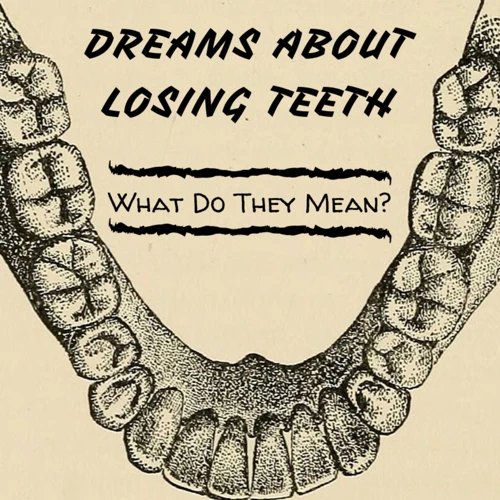
There’s nothing quite as unsettling as the vivid dream of one’s teeth falling or missing. This common nightmare theme can leave us feeling vulnerable and filled with anxiety. The symbolism behind falling or missing teeth in dreams often points to deeper fears and insecurities. It may represent a fear of aging and mortality, as our teeth are a symbol of our youth and vitality. The loss or damage to our teeth can also symbolize feelings of powerlessness or a lack of control in our lives. From a psychological perspective, these dreams may be related to issues of self-image and communication. The fear of judgment and rejection by others can manifest in the form of losing one’s teeth, symbolizing a loss of confidence or fear of not being heard. Exploring the symbolic significance of falling or missing teeth dreams can provide valuable insights into our fears, insecurities, and the complexities of our relationships with others.
8.1 Fear of Aging and Mortality
The fear of aging and mortality is a profound aspect of the human experience, and it often manifests in nightmares where individuals dream about their teeth falling out. This symbolic imagery taps into our deep-seated anxieties surrounding the passage of time, our eventual aging, and the inevitability of death. The loss of teeth in dreams can be a metaphorical representation of the decay and decline associated with growing older. It serves as a stark reminder of our fragility and the transient nature of life. The fear of aging is closely intertwined with the fear of losing our youth, vitality, and attractiveness. Teeth, being an essential component of our appearance, represent our physical and aesthetic self. The sight of them falling out symbolizes a loss of identity, confidence, and youthful vitality. These dreams can also point to feelings of powerlessness and the sense of being unable to control the natural progression of time. People who are undergoing significant life transitions, such as approaching middle age or reflecting on their mortality, may be particularly prone to these dreams. Understanding the underlying fears and emotions associated with the fear of aging and mortality can aid individuals in embracing their mortality as a natural part of life and finding ways to live more fully in the present.
8.2 Social and Communication Concerns
Social and Communication Concerns
8.2 Social and communication concerns are deeply embedded within the symbolism of dreams featuring falling or missing teeth. These dreams often represent underlying fears and insecurities related to social interactions and the ability to effectively communicate with others. The loss of teeth in the dream can symbolize a fear of rejection, embarrassment, or feeling exposed in social situations. It may indicate a lack of self-confidence or a fear of not being heard or understood by others. Individuals who experience these dreams may struggle with social anxiety, fear of judgment, or difficulty expressing themselves openly. The teeth serve as a metaphor for communication, and their falling out reflects a perceived loss of the ability to effectively convey one’s thoughts or emotions. These dreams can serve as a wake-up call to address underlying issues that may be hindering social interactions and communication skills. Developing self-confidence, seeking support from loved ones or professionals, and actively working on improving communication can help alleviate these anxieties and enhance interpersonal relationships.
8.3 Revealing the Symbolic Significance
Revealing the symbolic significance of dreams where teeth fall out is a fascinating journey into the depths of our subconscious. These dreams often provoke intense feelings of fear and insecurity, but they hold powerful symbolism that can offer valuable insights into our lives. One interpretation of this symbolism is rooted in the fear of aging and mortality. Losing teeth represents the loss of vitality and youth, reminding us of the fleeting nature of life. It may also reflect concerns about our appearance and social acceptance. Another layer of symbolism in these dreams is related to communication and self-expression. Teeth are essential for speaking and conveying our thoughts and ideas. Thus, their falling out in dreams may suggest difficulties in effectively expressing ourselves or fear of being misunderstood. Additionally, these dreams may stem from underlying anxieties related to personal power and control. Losing teeth can be seen as a metaphor for feeling powerless or lacking control in certain areas of life. Exploring and unraveling the symbolic significance of teeth falling out dreams can provide valuable insights into our deepest fears and insecurities, allowing us to address and work through them in our waking lives.
9. Infidelity or Cheating

Discovering one’s partner or spouse’s infidelity is a deeply distressing experience that can shatter the foundation of trust and security in a relationship. The nightmare theme of infidelity or cheating taps into these fears and insecurities, highlighting the vulnerability that comes with intimate relationships. These dreams often symbolize larger issues of trust, betrayal, and insecurity within ourselves and our relationships. They can stem from a fear of being deceived or abandoned, and may also reflect feelings of inadequacy or low self-esteem. The symbolism behind infidelity dreams encourages us to examine the dynamics within our relationships and address any underlying trust issues or insecurities. By confronting these fears head-on, we can work towards fostering healthier and more fulfilling connections with ourselves and our partners.
9.1 Betrayal and Trust Issues
Betrayal and trust issues form a central theme in the haunting nightmares of many individuals. These dreams often reflect deep-seated fears and insecurities related to trust, loyalty, and betrayal within relationships. The symbolism in these dreams revolves around the fear of being deceived or abandoned by someone we hold dear. They may also stem from past experiences of betrayal, which have left a lasting impact on our psyche. Dreams of betrayal can manifest in various ways, such as discovering a partner’s infidelity, being backstabbed by a friend, or even witnessing a loved one betraying us for personal gain. These nightmares evoke intense emotions of hurt, anger, and fear, reflecting our vulnerability and the need to protect ourselves from potential harm. Examining these dreams can provide a window into our unresolved trust issues and the need to work on healing and establishing healthier boundaries within our relationships. Understanding the symbolic representation of betrayal in our dreams is a crucial step towards personal growth and cultivating trust in our waking lives.
9.2 Insecurity and Relationship Dynamics
Insecurity and relationship dynamics play a significant role in the symbolism behind dreams of infidelity or cheating. These dreams often stem from deep-rooted insecurities within ourselves or within the relationship. The fear of being betrayed or replaced can trigger these unsettling dreams, leaving us feeling vulnerable and questioning the trust we have in our partner. Symbolically, these dreams may reflect our own feelings of inadequacy or fear of not being enough for our partner. They may also serve as a mirror to unresolved trust issues or past relationship traumas. Insecurity in a relationship can arise due to various factors such as communication issues, lack of emotional connection, or external influences. These dreams act as a subconscious warning sign to address these insecurities and have open and honest conversations with our partners to strengthen the foundation of trust in the relationship. Understanding the role of insecurity and relationship dynamics in these dreams allows us to delve deeper into the complex emotions at play and paves the way for growth and healing within ourselves and our relationships.
9.3 Decoding the Symbolism
Decoding the symbolism behind the nightmare theme of infidelity or cheating can provide profound insights into our fears and insecurities within relationships. These haunting dreams often evoke a sense of betrayal and trust issues that may stem from past experiences or deep-rooted insecurities. The act of infidelity in the dream serves as a metaphor for feelings of inadequacy, fear of abandonment, or doubts about our own worthiness. It may reflect feelings of insecurity in the relationship or a lack of trust in our partner. Exploring the symbolic meaning of these dreams can help us recognize the need for open communication and address any underlying issues that may be causing these anxieties. It is essential to differentiate between the dream symbolism and the reality of our relationship, as dreams often exaggerate emotions and circumstances. By acknowledging and reflecting on the symbolism in these nightmares, we can gain a deeper understanding of our own fears and work towards building healthier, more fulfilling relationships.
10. Nude or Exposed in Public
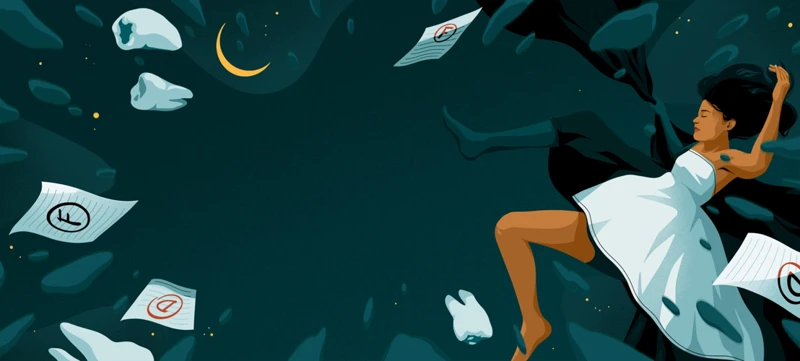
Picture this: you find yourself standing in the midst of a bustling crowd, only to realize that you are completely nude or exposed. The dream of being naked in public is a recurring nightmare that elicits a sense of vulnerability and embarrassment. The symbolism of this dream is deeply rooted in our social anxieties and self-image. Being naked in public represents a fear of judgment and criticism, a fear of being seen for who we truly are, flaws and all. It reflects our insecurities about our physical appearance and our fear of being exposed and scrutinized by others. This dream may be triggered by experiences of feeling exposed or judged in real life, or it could stem from a general lack of self-confidence. Unraveling the symbolic meaning of being naked in public can help us understand and address these underlying insecurities, and ultimately empower us to embrace our authentic selves, imperfections included.
10.1 Fear of Judgment and Criticism
The theme of being nude or exposed in public in our nightmares often stems from a deep-seated fear of judgment and criticism. The very thought of being vulnerable and exposed for others to see can trigger intense anxiety and feelings of shame. This nightmare symbolizes our fear of being seen for who we truly are, without any masks or pretenses. It reflects our concerns about how others perceive us and the fear of being rejected or ridiculed. The fear of judgment is closely tied to our self-esteem and body image, as we worry about being evaluated based on our physical appearance or actions. These dreams may arise from past experiences of embarrassment or instances where we felt humiliated in front of others. The symbolism of being naked in public serves as a reminder to address and overcome our insecurities, to embrace our authentic selves, and to let go of the fear of what others think. By acknowledging and overcoming this fear, we can empower ourselves to live more freely and confidently in our waking lives.
10.2 Self-Esteem and Body Image
Self-esteem and body image are closely intertwined aspects of our self-perception and can have a significant impact on our mental well-being. In the context of nightmares, the presence of being nude or exposed in public often relates to deep-seated insecurities and concerns about how we are perceived by others. This specific nightmare theme, , reflects the fear of judgment and criticism that stems from our vulnerabilities being exposed to others. When we dream of being naked in public, it can trigger feelings of shame, embarrassment, and a sense of inadequacy. These dreams may be fueled by societal pressures to conform to certain beauty standards or internalized beliefs about our own flaws and imperfections. The symbolism of being nude or exposed in public serves as a metaphor for our innermost insecurities and the fear of being scrutinized or rejected for who we truly are. It highlights the profound impact that self-esteem and body image issues can have on our psychological well-being. It is important to recognize that these dreams are not a reflection of our true worth, but rather an opportunity to confront and address these deeply ingrained insecurities. By increasing our self-acceptance and developing a more positive body image, we can work towards building a healthier sense of self-esteem and overall psychological resilience.
10.3 Interpreting the Symbolic Meaning
When it comes to the nightmare of being nude or exposed in public, interpreting the symbolic meaning requires a closer look at the underlying emotions and psychological implications. This dream theme often reflects deep-seated fears of judgment, criticism, and vulnerability. Individuals who frequently experience this type of nightmare may struggle with feelings of low self-esteem and a fear of being seen for who they truly are. The exposure of one’s body in public can also symbolize a fear of being exposed emotionally, feeling stripped of defenses and personal boundaries.
To further unravel the symbolic meaning, it is important to consider the individual’s relationship with their body and self-image. Those who have difficulties accepting their physical appearance or have experienced body shaming may be more prone to having these types of dreams. It is not uncommon for these nightmares to manifest during times of increased stress or when the individual is facing important life events that evoke insecurities and self-doubt.
Cultural and societal influences play a significant role in shaping the interpretation of these dreams. In a society that places a heavy emphasis on physical appearance and conformity, the fear of being exposed in public can be magnified. The nightmare may reflect a fear of not meeting society’s standards or being judged and ostracized for being different.
It is worth noting that the interpretation of the symbolic meaning varies from person to person based on their individual experiences and personal history. Therapeutic techniques such as dream analysis and psychotherapy can be helpful in uncovering the deeper psychological roots of these nightmares and assisting individuals in addressing underlying issues of self-image and social anxiety.
The nightmare of being nude or exposed in public symbolizes the fear of judgment, vulnerability, and low self-esteem. By delving into the symbolic meaning, individuals can gain a better understanding of their fears and work towards building self-acceptance and resilience in the face of societal pressures.
11. Being Attacked or Assailed
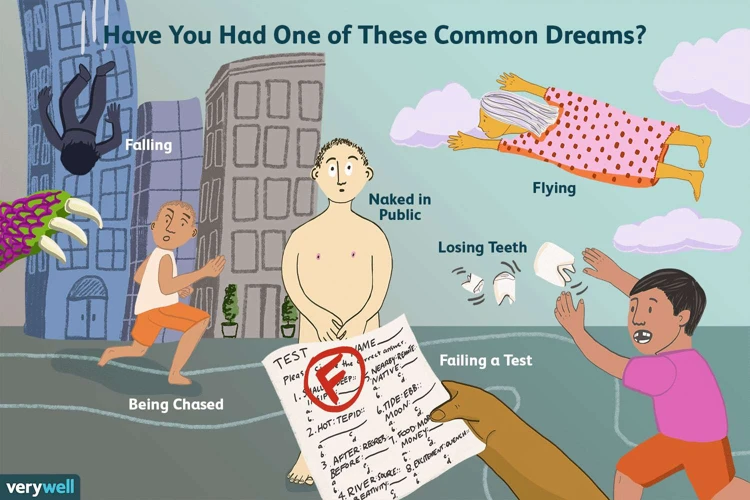
Being attacked or assailed in a dream can be an incredibly distressing and disorienting experience. The symbolism within these nightmares runs deep, reflecting our vulnerabilities and the fears we harbor in our subconscious. This type of dream often signifies a sense of vulnerability and threat, highlighting our anxieties and stressors in waking life. The attack can range from physical violence to verbal assault, representing emotional trauma or unresolved conflicts. Traumatic experiences or high-stress situations in our past may manifest in these dreams, leaving us feeling overwhelmed and helpless. It is vital to explore the roots of these nightmares and the emotions they evoke, as they can provide valuable insights into our internal struggles and the impact they have on our overall well-being. By understanding the symbolism hidden within dreams of being attacked or assailed, we can begin to address and heal from past traumas, creating a path towards emotional growth and resilience.
11.1 Vulnerability and Threat
A significant aspect of nightmares involving being attacked or assailed is the theme of vulnerability and threat. In these disturbing dreams, individuals often find themselves in situations where they are defenseless against an impending danger or harm. The symbolism behind this theme delves into deep-rooted fears and anxieties related to feeling unprotected or powerless in the face of potential threats. The sense of vulnerability in these nightmares could stem from unresolved trauma, past experiences of being victimized, or a general fear of being unable to defend oneself. It may also reflect a broader fear of facing emotional or psychological challenges in waking life. The threat within these dreams could manifest in various forms, such as being chased by an unknown assailant, attacked by a wild animal, or confronted by a supernatural entity. These threats symbolize the internal struggles we face and the external pressures that impose upon us. The vivid and unsettling nature of these nightmares underscores the urgency to address our fears, build resilience, and seek support or coping mechanisms to regain a sense of inner strength and protection.
11.2 Trauma and Emotional Stress
Trauma and emotional stress play a significant role in the interpretation of nightmares where the individual is being attacked or assailed. These dreams may reflect past traumatic experiences or unresolved emotional turmoil. The symbolism within these nightmares brings attention to the impact of trauma and emotional stress on our subconscious mind. When we experience trauma or emotional stress, our brain stores these memories and emotions, which can resurface during our dreams. The feeling of vulnerability and threat in the dream may represent the lingering effects of trauma, triggering feelings of fear, anxiety, or powerlessness. It is important to acknowledge that these dreams may not only be a reflection of past experiences but also a manifestation of current emotional distress. Working with a therapist or counselor can provide a safe space to process and heal from these traumas, reducing the frequency and intensity of such nightmare episodes. By addressing the underlying trauma and emotional stress, individuals can begin to regain a sense of safety and security in their dreams and in their waking lives.
11.3 Unraveling the Symbolism
Unraveling the symbolism behind nightmares can provide a profound understanding of the subconscious fears and anxieties that manifest in our dreams. In the context of dream interpretation, unraveling the symbolism of a nightmare is akin to decoding a cryptic code, where each element represents something deeper and more profound. By examining the various symbols and motifs present in a nightmare, we can begin to unravel the hidden meanings and gain insight into our innermost thoughts and emotions.
One effective approach to unraveling the symbolism is to keep a dream journal. Recording your nightmares and reflecting on the recurring symbols and themes can reveal patterns and connections that may not be immediately apparent. Pay attention to the specific details and emotions associated with each symbol in your dream, as they hold important clues to its significance.
Additionally, exploring the cultural and personal associations attached to certain symbols can provide further insights into their meaning. Symbols can have universal interpretations, but they can also be deeply personal, influenced by our individual experiences and cultural backgrounds.
It’s important to note that the interpretation of symbolism in nightmares is highly subjective. What may hold a specific meaning for one person might have a different interpretation for another. This is why a personal approach to dream analysis is essential.
To further unravel the symbolism, it can be helpful to engage in conversation or seek guidance from professionals, such as psychologists or dream analysts. Their expertise and knowledge can offer valuable interpretations and shed light on the hidden messages within nightmares.
Ultimately, the process of unraveling symbolism in nightmares is an ongoing journey of self-discovery. Each dream holds a unique combination of symbols, emotions, and personal context that contributes to its underlying meaning. Embrace the puzzling nature of symbolism, and with an open mind and thoughtful reflection, you can unlock the secrets hidden beneath the surface of your nightmares.
12. Failing an Important Task
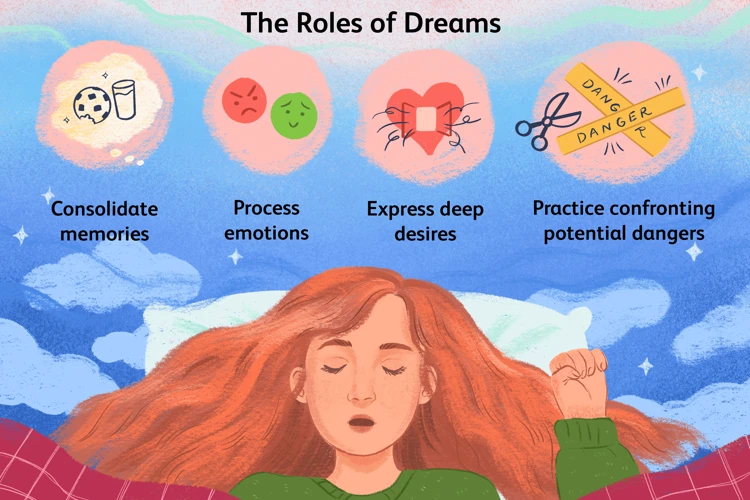
The fear of failure is a common theme that manifests in our nightmares, often taking the form of failing an important task. These dreams can be incredibly distressing, leaving us with feelings of inadequacy and disappointment. The symbolism behind these nightmares lies in our deep-seated fears of not meeting expectations, whether they are self-imposed or externally imposed by others. Failing an important task in our dreams may reflect our anxieties about underperforming or not being able to live up to the standards we have set for ourselves. It can also be a manifestation of the pressure we feel to succeed in various aspects of our lives. These dreams can be particularly intense for individuals who have high expectations of themselves or who are facing significant challenges or responsibilities. Exploring the symbolic meaning of these nightmares can provide valuable insights into our psychological landscape and help us address our fears and insecurities surrounding failure.
12.1 Fear of Inadequacy and Disappointment
The fear of inadequacy and disappointment is a common theme that emerges in nightmares. In these dreams, individuals often find themselves in high-pressure situations where they are expected to perform or achieve certain goals. The fear of not measuring up or falling short creates a sense of anxiety and unease, leading to nightmares that reflect these deep-rooted fears. These dreams may involve scenarios such as failing an important test, not meeting deadlines, or making critical mistakes at work. The fear of disappointing others or not meeting their own expectations can manifest in vivid imagery and intense emotional responses during sleep. This fear may stem from feelings of self-doubt, low self-esteem, or imposter syndrome. It could also be tied to past experiences of failure or a fear of judgment from others. Understanding the symbolism behind these dreams can provide valuable insights and serve as a catalyst for personal growth and self-improvement. By addressing the fear of inadequacy and disappointment head-on, individuals can work towards building confidence, setting realistic goals, and recognizing their own worth and potential.
12.2 Performance Anxiety and High Expectations
Performance Anxiety and High Expectations:
– Performance anxiety is a common source of stress and fear for many individuals. The pressure to succeed and meet high expectations can manifest in our dreams as a recurring theme of failure or inadequacy. These nightmares often reflect the deep-seated worries and insecurities we have about our abilities and performance in various aspects of life, whether it be work, school, or personal relationships. The fear of not meeting expectations, whether they are self-imposed or external, can lead to intense anxiety and a constant fear of failure.
– High expectations, whether from ourselves or others, can create a tremendous amount of pressure. We may fear disappointing others or falling short of what is anticipated of us. This fear can seep into our dreams, presenting us with scenarios where we are being judged, evaluated, or involved in situations where success is paramount. These dreams may feature tests, interviews, or situations where the stakes are high, mirroring the anticipation and stress associated with real-life situations.
– The presence of performance anxiety and high expectations in our dreams serves as a reflection of the psychological burdens we carry in our waking lives. It highlights the need to address these underlying fears and insecurities, and to examine the standards and expectations we set for ourselves. Understanding the symbolism in these dreams can provide valuable insights into our fears of judgment, our need for validation, and the impact of societal pressures on our well-being. By addressing the root causes of performance anxiety and reassessing our expectations, we can alleviate the stress and fear manifested in our nightmares and strive for a healthier and more balanced approach to our goals.
12.3 Analyzing the Symbolism
Analyzing the symbolism behind the nightmares we experience can offer profound insights into our subconscious fears and anxieties. In the context of the dream theme of failing an important task, there are several layers of symbolism to explore. The fear of inadequacy and disappointment is a common thread within these dreams, reflecting our deep-seated concerns of not meeting the high expectations we set for ourselves or those imposed upon us by others. Performance anxiety often plays a significant role in this type of nightmare, causing us to doubt our abilities and fear the consequences of failure. These dreams may also be influenced by childhood trauma or experiences of academic pressure, which can further contribute to the symbolic representation of the task at hand. By delving into the symbolism of these dreams, we can gain a better understanding of our fears and insecurities surrounding achievement and uncover the underlying emotional factors that may be hindering our progress.
13. Being Trapped or Imprisoned
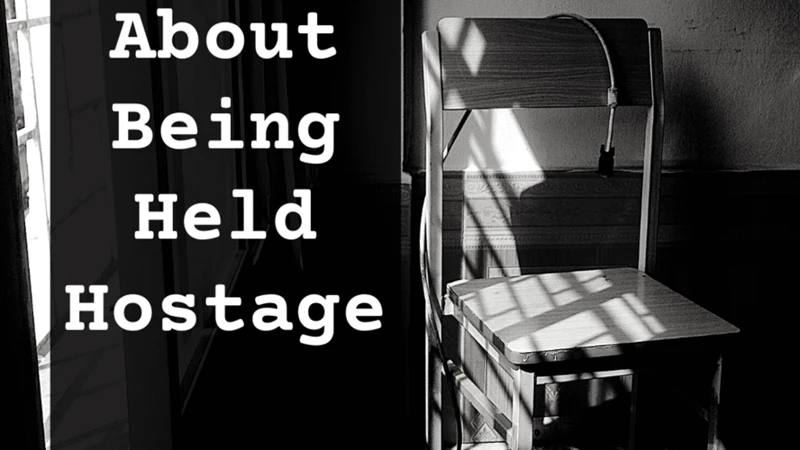
Finding oneself trapped or imprisoned in a nightmare is a distressing experience that can leave a lasting impact on our subconscious. This common nightmare theme symbolizes a sense of restriction and powerlessness in our waking lives. The feeling of being trapped often mirrors the emotional and psychological constraints we may be facing, whether in relationships, work environments, or personal circumstances. It can signify a lack of freedom, a fear of being confined or controlled, or a sense of being stuck in an undesirable situation. These dreams may be triggered by real-life experiences of feeling trapped or overwhelmed, or they may stem from deep-rooted fears and anxieties. Exploring the psychological meanings behind this unsettling imagery can help shed light on our own feelings of restriction and empower us to seek ways to break free from the confines that hold us back.
13.1 Restriction and Powerlessness
The nightmare theme of being trapped or imprisoned is a symbolic reflection of restriction and powerlessness. When we dream of being trapped, whether it’s in a small room, a locked cage, or an underground dungeon, it represents a feeling of being confined or limited in some aspect of our lives. This symbolism can manifest in various ways, reflecting our fears of being trapped in a job we dislike, a toxic relationship, or even our own self-imposed limitations. The dream may also point to a sense of powerlessness, where we feel unable to escape or change our circumstances. This can be associated with feelings of being trapped in an unhealthy mindset, repetitive patterns, or external situations that we perceive as overwhelming. Our unconscious mind uses the imagery of being trapped or imprisoned to highlight the psychological barriers we face and the need for freedom and autonomy. By exploring the symbolism of this dream theme, we can gain insights into areas where we may be holding ourselves back or need to break free from restrictive beliefs and situations.
13.2 Exploring Psychological Meanings
When exploring the psychological meanings behind nightmares involving being trapped or imprisoned, a deeper understanding of our subconscious fears and emotions can be revealed. The experience of feeling trapped or imprisoned in a dream often reflects a sense of powerlessness and restriction in our waking lives. It can represent situations where we feel stuck, trapped in a job, a relationship, or even within our own minds. The symbolism of being confined can also signify unresolved emotional trauma or a desire for liberation from past experiences that continue to hold us captive. These dreams may arise when we are facing difficult decisions or feeling overwhelmed by the demands of our daily lives. They serve as a reminder to explore and address the underlying psychological factors contributing to our feelings of being trapped. By delving into these psychological meanings, we can gain valuable insights into our internal struggles and work towards finding the freedom and empowerment we seek.
13.3 Unmasking the Symbolism
Unmasking the symbolism behind dreams of being trapped or imprisoned can reveal profound insights into our psychological and emotional states. These dark and claustrophobic dreams often reflect feelings of restriction, powerlessness, and a lack of control in our waking lives. The concept of being trapped symbolizes a sense of being held back or unable to move forward. It may be indicative of internal conflicts, external pressures, or a fear of being confined by societal expectations. The symbolism of imprisonment can also represent unresolved emotions or past trauma that we have repressed or suppressed. It is essential to examine the context of the dream and the emotions it elicits to fully understand its symbolic meaning. Dream analysts suggest that dreams of being trapped may occur as a response to feeling stuck in a specific situation or a need for change and growth. By unmasking the symbolism in these dreams, we can gain a deeper understanding of our internal struggles and find ways to break free from self-imposed limitations. Exploring psychological meanings and seeking personal transformation are key aspects of understanding and interpreting dreams concerning being trapped or imprisoned.
14. Death or Dying
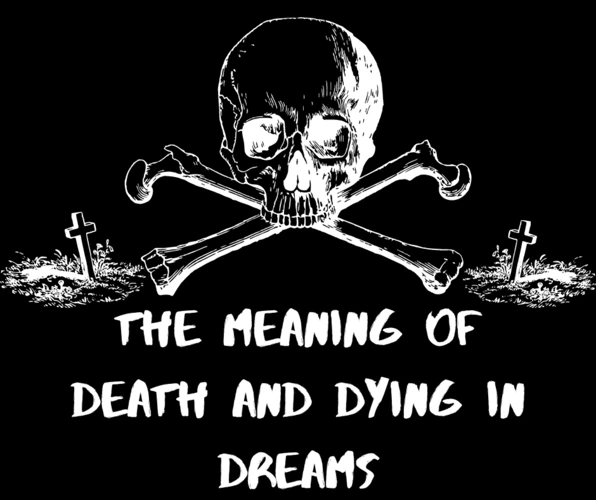
The concept of death is a universally perplexing and often anxiety-inducing topic, and it is no wonder that the theme of death or dying frequently appears in our nightmares. These haunting dreams can evoke a wide range of emotions, from fear and sadness to introspection and contemplation. Symbolically, dreams of death or dying often represent our fears of loss and the transient nature of life. They can reflect unresolved grief or the need to let go of certain aspects of our lives that are no longer serving us. However, it is important to note that dreams of death do not necessarily predict literal death and should not be interpreted as such. Rather, they offer an opportunity for introspection and reflection, allowing us to confront our mortality and explore the transformative nature of our existence. By delving into the symbolism behind these dreams, we can gain a deeper understanding of ourselves and our relationship with the concept of death.
14.1 Fear of Loss and Unresolved Grief
The presence of death or dying in nightmares often reflects a deep-seated fear of loss and unresolved grief. Dreams that explore this theme can be incredibly intense and emotionally charged. The fear of losing a loved one or experiencing the pain of their absence can manifest in dreams as symbols of death or dying. These dreams may be triggered by recent losses or past traumas that have not been fully processed or healed. The symbolism of death in these dreams can also represent a broader fear of change and the unknown. It is important to recognize that these dreams do not necessarily predict a physical death, but rather serve as a reflection of our emotional state and our need to confront and process grief. By acknowledging and addressing these fears and unresolved emotions, we can begin the healing process and work towards finding peace and acceptance.
14.2 Symbolic Reflections of Transformation
Symbolic Reflections of Transformation:
– Butterflies and Moths: In dreams where insects or bugs are prevalent, the presence of butterflies or moths often represents transformation and metamorphosis. These delicate creatures undergo a remarkable journey of growth, transitioning from caterpillars to graceful winged beings. In the realm of dreams, they signify the potential for personal growth and transformation within ourselves. The emergence of butterflies or moths can indicate the need for change, embracing new opportunities, and letting go of outdated beliefs or behaviors.
– Phoenix Rising: The phoenix is a mythical bird that symbolizes rebirth and renewal. In dreams, the appearance of a phoenix can signify a period of transformation and rising from the ashes of the past. It represents the ability to overcome challenges, leave behind what no longer serves us, and embrace a new chapter in life. The phoenix reminds us that even in the face of destruction, there is always the potential for rebirth and regeneration.
– Snake Shedding its Skin: Snakes are often associated with hidden wisdom and transformation. In dreams, witnessing a snake shedding its skin reflects the process of personal growth, renewal, and shedding old ways of being. Just as the snake discards its old skin to reveal a fresh new layer, this dream symbolizes the shedding of outdated beliefs, habits, or relationships that no longer serve our greater purpose.
– Hatching Eggs: Dreams of hatching eggs symbolize the potential for new beginnings and the birth of new ideas or projects. Just as an egg holds the promise of life within its shell, this dream signals the incubation of new possibilities, ideas, or opportunities. It represents the emergence of something new and exciting in our lives, offering us the chance to embark on a transformative journey.
The symbolism of transformation in dreams is rich and complex, offering us insights into our own personal growth and evolution. These symbols remind us that change is a natural part of life, and by embracing transformation, we can move towards a more authentic and fulfilling existence.
14.3 Revealing the Symbolic Significance
14.3 Revealing the Symbolic Significance:
Exploring the dreams of death or dying, we unravel profound symbolism that reflects both fears and transformations. Death, in the realm of dreams, often signifies more than just literal mortality. It represents the fear of loss, the end of a chapter, and the uncertainty of what lies beyond. Dreams of death can also symbolize the need for change or the shedding of old patterns and beliefs.
One interpretation of dreaming about death is that it reflects unresolved grief or the need to let go of past traumas. These dreams may serve as an opportunity for emotional healing and closure. It is important to remember that death in dreams rarely predicts actual physical death; rather, it serves as a metaphorical representation of emotional or psychological transitions.
Another layer of symbolic meaning in death dreams lies in transformation and rebirth. Death often marks the end of one phase of life and the beginning of another. It symbolizes the shedding of old identities, behaviors, or relationships, paving the way for personal growth and renewal. This dream may be a reflection of a desired change or a call to embrace transformation in waking life.
The specific circumstances surrounding death dreams can further enhance their symbolism. For example, dreaming about someone else’s death may symbolize the need to let go of that person or a particular aspect of the relationship. Alternatively, dreaming about one’s own death can represent the desire for self-discovery and self-acceptance.
Understanding the symbolic significance of death dreams requires introspection and a careful examination of one’s emotional landscape. These dreams provide an opportunity to confront and process fears, seek closure, and embrace the transformative power of change. Embracing the symbolism of death dreams can lead to profound personal growth and a more enriched understanding of our own journey through life.
15. Insects or Bugs Swarm
The sight of a swarm of insects or bugs crawling or buzzing around us in a nightmare can invoke a deep sense of discomfort and intrusion. These dreams are often characterized by a feeling of being overwhelmed or invaded, as if our personal boundaries are being violated. The symbolism behind insect swarms in nightmares can vary depending on the specific type of insect and the emotions it elicits. For example, a swarm of bees may represent a threat or a potentially painful situation, while a swarm of ants could symbolize feeling overwhelmed by responsibilities or a nagging sense of anxiety. Additionally, the insects themselves may have their own symbolic meanings. For instance, spiders can represent fear or being trapped, while butterflies might signify transformation or change. Decoding the symbolism of insect or bug swarms in nightmares can provide valuable insights into our underlying feelings of discomfort, invasion, or unease.
15.1 Discomfort and Feelings of Intrusion
The presence of insects or a swarm of bugs in our nightmares often evokes intense discomfort and creates a strong sense of intrusion. The symbolism behind this particular theme is deeply rooted in our subconscious fears and anxieties. Insects are often associated with things that disgust us, such as dirt, disease, and filth. Seeing a swarm of bugs in our dreams can trigger feelings of unease and revulsion. This discomfort may stem from a fear of being overwhelmed or invaded by external forces beyond our control. The symbolic representation of insects in our nightmares can also be linked to feelings of inadequacy or powerlessness. Just as insects are often small and easily squashed, we may feel insignificant or vulnerable in the face of life’s challenges and obstacles. Additionally, the presence of insects can represent the intrusion of unwanted thoughts or negative influences in our waking lives. These dreams may serve as a reminder to address and confront the discomfort and feelings of intrusion we experience, as well as to establish healthier boundaries and protect our inner peace. To delve deeper into the symbolic layers of insects and bugs in dreams, it is important to explore the unique psychological interpretations and significance they hold in our subconscious minds. Understanding the discomfort and feelings of intrusion associated with this common nightmare theme can guide us towards personal growth and self-awareness.
15.2 Symbolism in Insects and Bugs
The presence of insects and bugs in our nightmares can evoke a deep sense of discomfort and intrusion. These creepy crawlies hold a significant symbolism that reflects various aspects of our subconscious fears and anxieties. The symbolism of insects and bugs in dreams can vary depending on the specific type of insect or bug encountered. For example, spiders may symbolize manipulation or deception, while ants can represent feelings of being overwhelmed or burdened by responsibilities. Insects like cockroaches may signify a sense of filth or undesirable aspects of one’s life, while mosquitoes can represent irritations or small annoyances. The appearance of swarms of insects in dreams often amplifies the feelings of intrusion and powerlessness. It could symbolize a situation in waking life where we feel overwhelmed and outnumbered. Additionally, insects and bugs in dreams can also represent aspects of ourselves that we find bothersome or that we perceive as threats. The symbolism in insects and bugs is deeply rooted in the primal and instinctual aspects of our psyche, reflecting our fears, discomforts, and feelings of vulnerability. By decoding the symbolic meaning of insects and bugs in our dreams, we can gain a better understanding of the underlying emotions and experiences that shape our subconscious minds.
15.3 Decoding the Symbolism
Decoding the symbolism in dreams involving swarms of insects or bugs can provide a deeper understanding of the underlying emotions and fears. The presence of insects or bugs in a dream often symbolizes discomfort and feelings of intrusion. These tiny creatures invade our personal space, representing a sense of being overwhelmed or invaded. To further decipher the symbolism, it is important to consider the specific type of insect or bug in the dream. Each insect carries its own unique symbolic meaning. For example, a swarm of bees may represent the collective energy and busyness of life, while spiders can symbolize entrapment or manipulation. The sheer number of insects can also indicate the magnitude or intensity of the emotional issue at hand. Additionally, the dreamer’s personal associations with insects and bugs can further inform the interpretation. For some, insects may evoke childhood memories or personal phobias, adding layers of complexity to the symbolism. Ultimately, decoding the symbolism requires careful consideration of the dreamer’s emotions, personal experiences, and the specific characteristics of the insects or bugs present in the dream. Understanding these intricate details can help unravel the deeper meaning behind the swarm and assist in personal growth and self-reflection.
Conclusion
In conclusion, exploring the symbolism within common nightmare themes offers a fascinating glimpse into the depths of our subconscious minds. These nightmares serve as gateways to understanding our deepest fears, insecurities, and unresolved emotions. The falling dream highlights our fear of failure and loss of control, while being chased or pursued unveils our underlying anxieties and the need to confront them. Teeth falling out exposes our vulnerability and sense of insecurity, while being naked in public taps into our social anxiety and self-image concerns. Dreams of drowning or suffocation reflect our feelings of helplessness and the need for liberation. Being lost or trapped signifies our longing for freedom and the struggle to find our place in the world. Exam or test anxiety reveals our fear of judgment and failure, while infidelity or cheating represents our trust issues and insecurities in relationships.
The symbolism found in nightmares is deeply rooted in our subconscious, often influenced by past traumas, societal pressures, and personal experiences. By decoding these symbols, we can gain a better understanding of ourselves and our innermost desires. It is important to approach these nightmares with curiosity and an open mind, allowing ourselves to delve into the layers of symbolisms and emotions they contain.
Remember, nightmares are not to be feared but rather to be embraced as valuable sources of self-discovery and growth. By analyzing the symbolism within our nightmares, we can gain insight, heal from past wounds, and ultimately take steps towards a more fulfilling and empowered life. So the next time you find yourself tangled in the web of a disturbing dream, take a moment to reflect on its symbolism and uncover the hidden messages it holds.
In this article, we have explored various common nightmare themes, ranging from falling dreams to being attacked or assailed, from failing important tasks to feeling trapped or imprisoned. Each of these themes carries its own unique symbolism, shedding light on different aspects of our psyche and the challenges we may be facing. Through the process of decoding these symbols, we can gain a deeper understanding of ourselves and our subconscious mind.
As we navigate through the mysterious world of dreams, it is important to remember that dreams and nightmares are a natural part of the human experience. They are windows into our innermost thoughts and emotions, and should be embraced as powerful tools for self-reflection and personal growth. By unraveling the symbolism in our nightmares, we can uncover hidden truths about ourselves and use this knowledge to guide us on our journey towards self-discovery and fulfillment. Goodnight, and may your dreams be filled with insight and understanding.
Frequently Asked Questions
1. What are nightmares and why do we have them?
Nightmares are vivid and distressing dreams that can evoke intense fear, anxiety, or sadness. They often occur during the rapid eye movement (REM) stage of sleep. Nightmares can be caused by a variety of factors, including stress, trauma, medication, or underlying mental health conditions.
2. Are nightmares a sign of mental illness?
Nightmares are not exclusive to mental illness, but they can be a symptom of certain conditions such as post-traumatic stress disorder (PTSD), anxiety disorders, or depression. It’s important to consider other factors and seek professional help if nightmares are causing significant distress or interfering with daily life.
3. Can nightmares be interpreted or analyzed?
Yes, nightmares can be interpreted and analyzed to uncover their symbolic meaning. Dream analysis can provide insights into our subconscious thoughts, fears, and emotions. However, it’s important to remember that dream interpretation is subjective and personal, and different symbols can hold different meanings for individuals.
4. How can recurring nightmares be stopped?
There are several strategies that can help alleviate recurring nightmares. These include practicing relaxation techniques before bed, maintaining a regular sleep schedule, creating a calm sleep environment, and addressing and managing underlying stress or trauma. Cognitive behavioral therapy (CBT) can also be effective in treating recurring nightmares.
5. Can nightmares be linked to real-life experiences?
Yes, nightmares can be linked to real-life experiences. They can be influenced by traumatic events, daily stressors, or unresolved emotions. Our subconscious mind may use the imagery of nightmares to process and make sense of these experiences.
6. Do nightmares serve any purpose?
While nightmares can be distressing, they serve a purpose in our psychological well-being. They can act as a release valve for stress, help us confront unresolved issues, and provide opportunities for personal growth and self-reflection.
7. Can nightmares be prevented?
While it may not be possible to completely prevent nightmares, certain lifestyle changes can help reduce their frequency. Maintaining a healthy sleep routine, managing stress, and addressing any underlying mental health concerns can contribute to better sleep and fewer nightmares.
8. Are there any cultural or universal symbols in nightmares?
While some symbols in nightmares may be universal, such as falling or being chased, the meaning of these symbols can vary across cultures. Additionally, personal experiences and associations can greatly influence the symbolism of nightmares.
9. Do nightmares have any physical effects on the body?
Nightmares can have physical effects on the body, such as increased heart rate, sweating, or disrupted sleep. These physical responses are part of the body’s natural stress response and are commonly experienced during intense or frightening dreams.
10. Can medication help with nightmares?
In certain cases, medication may be prescribed to help manage nightmares, particularly if they are associated with a specific mental health condition. However, medication should always be used under the guidance of a healthcare professional and is not a standalone solution for addressing nightmares.

